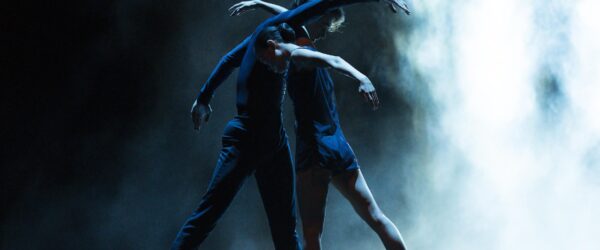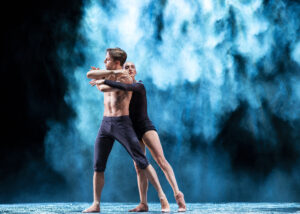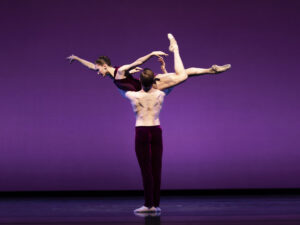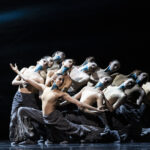At Pacific Northwest Ballet, Alejandro Cerrudo’s One Thousand Pieces is returning, but they’ve never performed it for a live audience before. In March of 2020, a single dress rehearsal of the piece was the last thing the dancers performed before COVID-19. PNB has since been haunted by Cerrudo’s piece, and now, with Bacchus on the playbill as a delightfully Dionysian opener, Cerrudo’s mirror finally shatters—enchantingly, spectacularly so.
Inspired by Marc Chagall’s America Mirrors, the three-paneled cerulean stained-glass windows he gifted to the Chicago Art Institute, the piece is a whirlwind of delicately interconnected disconnections. Deeply abstract but brilliantly felt, it is an ocean of an ensemble, grounded in its narrativelessness with a few essential coastlines: the set is evocative of a brutalist skyscraper shattered into glass and mist and mirror, the first dancer wearing an open suit like a commuter on the subway suddenly transported here. I think of the poem Invisible Fish by Joy Harjo:
Invisible fish swim this ghost ocean now described by waves of sand, by water-worn rock. Soon the fish will learn to walk. Then humans will come ashore and paint dreams on the dying stone. Then later, much later, the ocean floor will be punctuated by Chevy trucks, carrying the dreamers’ descendants, who are going to the store.
A different poem recited halfway through the show offers another way of understanding the piece—the creation of movement as a means for connection as an ode to the mysticism of love.
The second part of the three-part piece—paralleling the three panels of the America Windows—is unlike anything I have ever seen. When the curtain rises, the stage is covered in water. Dancers vanish and materialize out of plumes of mist that replace the back wall of the theater, then slide fast across the stage, spitting water from their limbs like welder’s arcs. They are the dreamers’ descendants punctuating Harjo’s ocean floor.
The water is also a technical challenge. Its slipperiness demands a different approach to weight and gravity and momentum, but the spellbinding effect took a lot of work. The dancers learned the choreography dry, although many steps cannot be performed without water, then practiced it in special rehearsals with the water on a stage whose wings could be mistaken for a hotel for all the towels that needed to be stacked there.
Mystery is at the heart of One Thousand Pieces—the mysteries of all interconnections between things, but especially movement, love, and the immeasurability of infinity. In Marc Chagall’s words, “A stained glass window is a transparent partition between my heart and the heart of the world. Stained glass has to be serious and passionate. It is something elevating and exhilarating.” Cerrudo’s piece has set these two hearts flying. And the 24-dancer ensemble of the piece moves synchronously in line, passing the hearts between them like whispers.
With its wave-like lifts and duets of collapse and extension, the lush but frenetic choreography wants to think about its own energy conceptually—rather than only requiring it from the dancers. This is movement made for the appreciation of movement itself, the dance wondering at its own dancing in appreciation and celebration of it. The feeling is reminiscent of the America Windows imagery celebrating various artistic mediums, including music, literature, and dance.
The score is collaged from the extensive discography of minimalist composer Philip Glass, including a piece taken from the soundtrack of Dracula (1931) and multiple other film soundtracks. It took months of archival work to find the scores and receive permissions so that it could be performed live by the PNB orchestra instead of as a recording. In a similar celebration of the act of art-making, a violinist steps out into the audience for a moment, and continues to play.
Matthew Neenan’s made-for-PNB opening piece, Bacchus, has a different tone. Witty and romantic, with gorgeous flowing purple costumes by Mark Zappone, it’s more than just a party in the forest, and leaves the enduring sense of also being an ode to the six kinds of love the ancient Greeks defined. Through its mischievously amorous duos and trios, dramatic pas de quatres, and not-so-secret trysts frozen in chiaroscuro over the course of a night that lasts forever, Bacchus has its own mysteries to uncurl.
Bacchus and One Thousand Pieces runs from March 15-24 at Pacific Northwest Ballet, McCaw Hall, Seattle Center 321 Mercer, Seattle 98109
Tickets: https://order.pnb.org/events?k=rep4
Transportation: McCaw Hall is at Seattle Center, best accessed via the Monorail and Light Rail. There is also a parking garage next to the theater, and limited street parking.




















